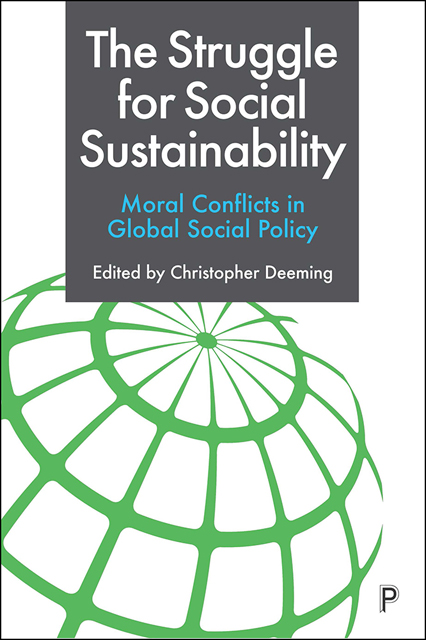Book contents
- Frontmatter
- Contents
- List of boxes, figures and tables
- List of abbreviations
- Notes on contributors
- Acknowledgements
- Preface
- 1 The ‘social’ in the age of sustainability
- 2 ‘No such thing as society’? Neoliberalism and the social
- 3 The social question: reconciling social and economic imperatives in policy
- 4 Disputing the economization and the de- politicization of ‘social’ investment in global social policy
- 5 The social dimension of sustainable development at the UN: from Brundtland to the SDGs
- 6 Paradigm lost? Blocking the path to ecosocial welfare and post- productivism
- 7 World population prospects at the UN: our numbers are not our problem?
- 8 Ageing sustainably
- 9 The political challenges to governing global migration and social welfare
- 10 Bringing in ‘the social’: an intersectional analysis of global crises and welfare
- 11 Global social policy and the quasi- concept of social cohesion
- 12 Putting the global in social justice?
- 13 ‘Go- social’? Inclusive growth and global social governance
- 14 For better or worse?
- 15 The struggle for social sustainability
- Index
5 - The social dimension of sustainable development at the UN: from Brundtland to the SDGs
Published online by Cambridge University Press: 14 April 2023
- Frontmatter
- Contents
- List of boxes, figures and tables
- List of abbreviations
- Notes on contributors
- Acknowledgements
- Preface
- 1 The ‘social’ in the age of sustainability
- 2 ‘No such thing as society’? Neoliberalism and the social
- 3 The social question: reconciling social and economic imperatives in policy
- 4 Disputing the economization and the de- politicization of ‘social’ investment in global social policy
- 5 The social dimension of sustainable development at the UN: from Brundtland to the SDGs
- 6 Paradigm lost? Blocking the path to ecosocial welfare and post- productivism
- 7 World population prospects at the UN: our numbers are not our problem?
- 8 Ageing sustainably
- 9 The political challenges to governing global migration and social welfare
- 10 Bringing in ‘the social’: an intersectional analysis of global crises and welfare
- 11 Global social policy and the quasi- concept of social cohesion
- 12 Putting the global in social justice?
- 13 ‘Go- social’? Inclusive growth and global social governance
- 14 For better or worse?
- 15 The struggle for social sustainability
- Index
Summary
Introduction
Sustainable development (SD) is widely accepted as a form of development we, as humankind, should but do not have at the moment. Discussing SD, therefore, is not discussing reality but plans for desired changes based on perceived reality. Depending on who does the planning, perceptions of reality as well as desires for change may differ. This chapter discusses some of those plans with regard to the ‘social’ dimension of SD.
The social forms one of the cornerstones of the standard tripartite system of SD, consisting of environmental, economic and social dimensions (Elkington, 1997), often, in Wikipedia and elsewhere, illustrated as a triangular graph, with the three dimensions occupying three corners or overlapping bubbles. Recently, it has been complemented by the cultural dimension (Magee et al, 2012). This concept goes back to the Brundtland Commission (officially World Commission on Environment and Development) and its landmark report Our Common Future, published in 1987. It famously defined sustainable development as ‘development that meets the needs of the present without compromising the ability of future generations to meet their own needs’ (WCED, 1987: 43). This often-cited reference to intergenerational justice has shaped the popular understanding of SD, while inter-regional (social) justice has received a lot less attention. As just one case in point, there is no section entitled ‘social’ in a 2014 exhaustive, four-volume publication on Sustainable Development, and topics that could be interpreted as social are conspicuously under-represented (Blewitt, 2014).
This relative neglect is in contrast to the intent of the Brundtland Commission, whose members left little doubt that they considered the social a central component of SD, inextricably linked to economic and environmental concerns. Thus, in a passage cited much less frequently, the report went on to state that this definition entails ‘the concept of “needs”, in particular the essential needs of the world’s poor, to which overriding priority should be given’, as well as the concept of environmental limitations (WCED, 1987: 43). In addition, the report insisted that the times in which human activities and effects could be ‘neatly compartmentalized within nations, within sectors (energy, agriculture, trade), and within broad areas of concern (environment, economics, social)’ were over (WCED, 1987: 4).
- Type
- Chapter
- Information
- The Struggle for Social SustainabilityMoral Conflicts in Global Social Policy, pp. 89 - 108Publisher: Bristol University PressPrint publication year: 2021



